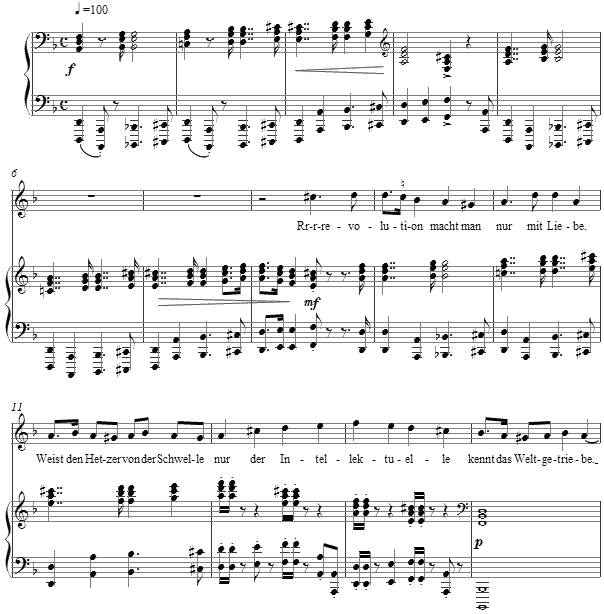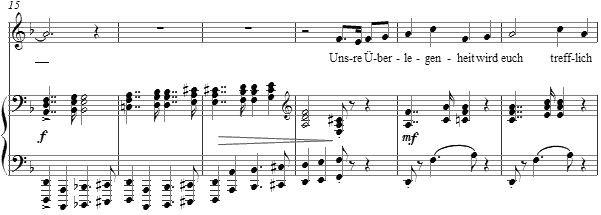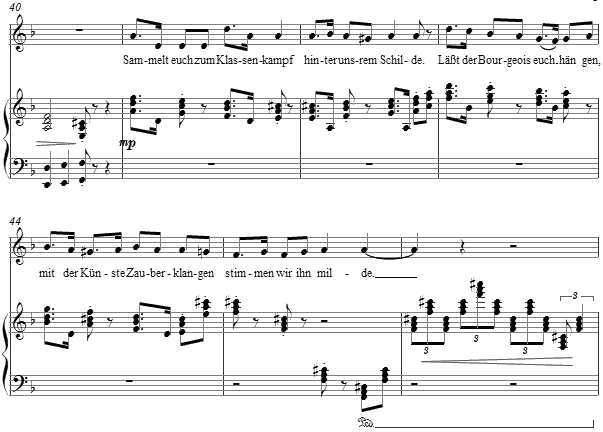Music and Texts of GARY BACHLUND
Vocal Music | Piano | Organ | Chamber Music | Orchestral | Articles and Commentary | Poems and Stories | Miscellany | FAQs
Gesang der Intellektuellen - (2010)
Erich Kurt Mühsam
for medium high voice and piano
Rr-r-revolution
macht man nur mit Liebe.
Weist den Hetzer von der Schwelle
nur der Intellektuelle
Kennt das Weltgetriebe.
Unsre Überlegenheit
wird euch trefflich führen.
Wählt nur uns in eure Räte,
dann wird Liebe früh und späte
Eure Seelen rühren.
Lieb den Bürger, Proletar,
denn dein Bruder ist er.
Und verdienst du ihm Millionen,
mag dich das Bewußtsein lohnen:
Ihr seid ja Geschwister.
Sammelt euch zum Klassenkampf
hinter unsrem Schilde.
Läßt der Bourgeois euch hängen,
mit der Künste Zauberklängen
stimmen wir ihn milde.
Aber kommt's zum Bürgerkrieg, –
ja kein Blutvergießen!
Auf den Kolben jeder Flinte
schreibt mit roter Liebestinte:
Brüder, nur nicht schießen!
Folgt dem geistigen Führerrat
zu des Werkes Krönung.
Einerseits die rote Fahne,
andrerseits die Buttersahne
lieblicher Versöhnung.
Rr-r-revolution
macht die Herzen schwellen.
Laßt die Freiheit uns errichten
mit den lyrischen Gedichten
der Intellektuellen.[ 5 pages, circa 3' 20" ]
Erich Kurt Mühsam
Song of the Intellectuals
Rr-r-revolution
Should be made with love.
Push the agitators away from the threshold.
Only the intellectuals
Know the true ways of the world.
Our superiority
Will direct you splendidly.
Vote us in to your councils,
Then will love from dawn to dusk
Bestir your souls.
Love the citizen, proletarians,
because he is your brother.
And let him earn his millions,
Let him see your understanding:
You are indeed siblings.
Assemble into the class struggle
Behind our placards.
Can the bourgeois hang you
With love's magic sounds
As we gently agree with him.
But when comes the civil war,
Yes, no bloodshed!
On the butt of each gun
Love writes with red ink:
Brothers, just do not shoot!
Follows such spiritual leadership
To the crown of good works.
On the one hand, the red flag,
On the other hand, the butter cream
Of sweet reconciliation.
Rr-r-revolution
Makes hearts swell.
Let us build the freedom
With the lyrical poems
Of the intellectuals.
gb
Mühsam noted that this text might be sung to the tune of Gaudeamus igitur. I will let others make such arrangements.
This muscled musical setting is intended to convey with directness the enthusiasm of the early 20th century flirtation with "Communism." [ 1 ] I write this word in quotes for Communism is a form of socialism, and the National Socialism of Hitler's Reich was the death of Mühsam, as I document in notes on another musical setting, Die Ahnung. Moreover, Mühsam spent much of his energy in later years writing for a monthly journal about anarchism as standing against central government, in Fanal, Anarchistische Monatszeitschrift. [ 2 ] In actual fact, Mühsam was an overt, idealistic anarchist, as he named himself a Communist anarchist in line with the fashionable notion of his era which believed Communism was something other than what it has proved to be historically. [ 3 ]
The opening gesture is repeated as a curtain between strophes as an anthem-like musical declaration of freedom against tyranny. The augmented second in the bass line and further in the setting reflects Mühsam's European Jewish cultural roots. Each short strophe is answered with a short interlude.
The emphasis on the tonic minor slips slightly away as the secco low D at measure 19 and beyond keeps the tonality from fully expressing a mediant F major. This is the first of the alternative textures for a B section of the setting which break up the militant bass line march in the tonic minor.
A textural and register change accompany another C section of the setting for relief from the muscular militancy of the opening gesture.
The score for Gesang der Intellektuellen is available as a free PDF download, though any major commercial performance or recording of the work is prohibited without prior arrangement with the composer. Click on the graphic below for this piano-vocal score.
NOTES
[ 1 ] Mühsam wrote in his tract titled The Liberation of Society from the State. What is Communist Anarchism? (Berlin-Britz, November 1932, Translated by CR Edmonston, 13 Sept 2008), "It is certainly clear that wherever society exits there is no room for the state, but that wherever the state is it is like a thorn in society’s flesh, it does not permit it to form a people who can socially inhale and exhale, and instead divides them into classes and thereby prevents them from being a society. A centralized construct cannot at the same time be a federalist construct. A system of management organized along authoritarian lines is a government, a bureaucracy, a commanding power, and this is the mark of the state; a community built upon equal rights and mutuality is, when considered within the bounds of their physical proximity, a people, when considered as a general form of human living, a society. State and society are opposing concepts; the one excludes the other."
Let us compare this anarchistic stance -- even though Mühsam identified it as communism per the early 20th century understanding of what that meant -- with the early 21st century politics of growing government, as represented by the Bush and Obama administrations, in which Mühsam correctly identified as "a system of management organized along authoritarian lines."
We are supposed to trust one party, one politician, one view as if a "savior," and indeed the rhetoric of the last several election cycles in the US has been about demonizing one party's stance while idealizing the other's.
In truth, the size and invasiveness of government has grown under both, as it has in the EU in recent years, and in both cases "is the mark of the state."
Modern academics like Howard Zinn offer a rational for the state, rather than for freedom, as one sees in his odd view of history as "unneutral." He wrote, "Objectivity is impossible and it is also undesirable. That is, if it were possible it would be undesirable, because if you have any kind of a social aim, if you think history should serve society in some way; should serve the progress of the human race; should serve justice in some way, then it requires that you make your selection on the basis of what you think will advance causes of humanity." Such political relativism is not what Mühsam and Goodman and other anarchists of the early 20th century advocated, for they distrusted "the state."
Modern polemicists like Zinn overtly trust a correct "state," as determined by one's political stance.
But this idealized central authority which the academic apologists for socialism is an empty lie.
As Aleksandr Solzhenitsyn clearly stated, "For us in Russia, communism is a dead dog, while, for many people in the West, it is still a living lion." BBC Radio broadcast, Russian service, as quoted in The Listener (15 February 1979).
Western academia believed in the living lion, while a self-proclaimed Communist anarchist, Mühsam, knew it to be a "dead dog" from the first decades of the 20th century. Solzhenitsyn went further, "I have spent all my life under a Communist regime, and I will tell you that a society without any objective legal scale is a terrible one indeed. But a society with no other scale but the legal one is not quite worthy of man either." (Harvard University address, 1978.)
One need then be very clear about what Mühsam and others in the early utopian anarchists' movement stood against; they stood against centralized authority, power and the state itself. His view that he was a Communist was of its time, and his writing informs that he was generally swept up in the era's rhetoric, but his own words tell of his confusion with what we have seen state socialism become.
Mühsam writes, "Wo Staat ist, kann keine Freiheit sein und keine werden." ("Where there is government, there is no freedom and can be no freedom.") in Fanal, Anarchistische Monatszeitschrift, Jg. 1, Nr. 1, October 1926.
For such a single statement, Mühsam would have been an enemy of the state in the Soviet Union, Mao's China, and any number of totalitarian Marxist nations whose enforcement of state power is absolute. It places Mühsam as a "communist" of that time in clear opposition "Communism" as it has been seen over the course of the 20th century ruling over millions of people.
One wonders about modern day social welfare governments from North America to Europe, viewed from the historical position of Mühsam's own assertion that central authority of any flavor is essentially oppressive.
As to the murderous history of government throughout the twentieth century, it has been documented well by University of Hawaii professor emeritus Rudolph Rummel, in his site, titled Freedom, Democracy, Peace; Power, Democide, and War -- www.hawaii.edu/powerkills/welcome.html.
Professor Rummel's historical and statistical findings generally and hugely agree with the assertion by Mühsam, "Where there is government, there is no freedom and can be no freedom." One only need consider the histories of the Nazi Genocide State and its 20,946,000 victims, the Soviet "Gulag State" and its 61,911,000 victims, and the Communist Chinese under Mao being responsible for the deaths of 35,236,000. Such astounding numbers have been too easily been ignored in favor of today's fashionably chic academic Marxists, whose enthusiasm to avoid the numerical facts of the history of socialism enforced by the postmodern hammer of political correctness rank them as either foolish, deluded or plainly malicious.
As Mühsam's contemporary in America, even the radical and violence prone anarchist Emma Goldman noted, "The most unpardonable sin in society is independence of thought." Mühsam expressed his independence of thought, and for this he was murdered.
Mühsam was a visionary, for in his Liberation of Society in 1932 he correctly foresaw "The attempt to arrive at socialism from capitalism by means of a transition state is condemned to failure by the nature of the state as a central ordering power." Moreover, he added, "All revolutions are undertaken because the lack of freedom has become unbearable, and its animating battle cry is always dedicated to freedom. And yet all revolutions thus far have been lost or at least have strayed from the path that the revolutionaries wished to tread, because the desire for freedom has remained unfulfilled." I would herein editorialize that all socialist revolutions "thus far" still evidence this.
Mühsam further informs us that "Wherever individuality is at work, there is a free spirit, which is incompatible with any centralism. The authoritarian leaders never raise themselves up above the masses through superior character or intellectual value, but always only through their qualities as commanders, which can grow only in underdeveloped personalities."
How many "leaders" have pretended to superior character or intellect, only to be caught out in compromised character or enormous failings in intellect, when tested? Too many.
Against such as them, a naive Mühsam of any nation or culture will always be identified as enemy of the state and persecuted. This is the how and why over one hundred million deaths may be attributed to the central authority of the social state in all its twentieth century permutations.
We have the observation-based opinion of Solzhenitsyn to bolster this truth, as he stated in his Nobel lecture from 1970, "Our Twentieth Century has proved to be more cruel than preceding centuries, and the first fifty years have not erased all its horrors." The astonishing number of dead from three socialist regimes alone -- Nazi Germany, the Soviet Union and Mao's China -- amplify Solzhenitsyn's truth, which was foreseen by Mühsam.
[ 2 ] Fanal means Torch, and his periodical was emblazoned with this logo.
Mühsam was without question and in spite of the confusion over terms a passionate advocate of freedom and equally passionate opponent of centralized power in the hands of government.
One section of Fanal speaks clearly of "Die Freiheit als gesellschaftliches Prinzip." ("Freedom as a social principle")
The emphasis on freedom and opposition to central authority makes Mühsam more the anarchist and less the Communist, based on the hindsight of eighty years since his brutal murder at the hands of the state. It is understandable that any centralized power would have clearly understood the threat of such a brazen expression of freedom, for freedom can really only be thought of in the prepositional phrase, "freedom from," wherein any centralized authority becomes de facto the oppressor. Several generations of academic enthusiasts for socialism have assiduously avoided the cold, hard fact that many of the early "Communist anarchists" would have been enemies of any Communist or socialist state. Such is the confusion over the entire political jargon surrounding socialism in all its forms.
What seems clear is that the communist anarchism of Mühsam would stand against any central authority, while too many Communists stand for some central authority. It is no wonder that the National Socialist thugs targeted such a poet and tract writer as their enemy; he was.
[ 3 ] The first decades of the 20th century were in part swept up in the utopian notions of what "intellectuals" believed Communism under the new Soviet regime was. In fact it was only shortly after the Bolshevik revolution that this belief was dashed by the reality of murderous state socialism.
America's quixotic and inconsistent anarchist Emma Goldman had once stated, "The ultimate end of all revolutionary social change is to establish the sanctity of human life, the dignity of man, the right of every human being to liberty and well-being."
And yet she published My Two Years in Russia, a work was published as My Disillusionment with Russia (1923), and My Further Disillusionment with Russia (1924) and finally as a complete one-volume edition (1925). This young American communist anarchist came soon to realize, "In its mad passion for power, the Communist State even sought to strengthen and deepen the very ideas and conceptions which the Revolution had come to destroy."
In like manner and in the same era, Mühsam carried the utopian flame of what Communism would never become, and was essentially snuffed out by the same "mad passion for power" of which Goldman so clearly wrote which overcame Germany as it did the Soviet Union. Socialism became the theoretical ground for governments which could do such horrors as the Soviet massacres of Babi Yar, Katyn Forest and so many more, the greatest being the Holodomor, or murder by starvation of between 3 and 10 million Ukrainians. Maoist China's Great leap forward alone was responsible for an estimated 20 million dead from starvation. Pol Pot's killing fields were the arena for state murder of approximately 2 million Cambodians, dead at the hands of the Khmer Rouge.
The examples are too numerous and too huge to ignore, and yet the fashionable academic position of many today is that somehow "socialism has never been really tried."
Compared to well over 100 million dead at its feet, socialism has been tried too often, one argues from simple numbers of its victims. And yet the modern apologists err is holding to their socialist idealism; one such is Zinn who said in a democracynow.org interview, "Whoa! I’m happy to hear that. Finally, socialism is getting a good name."
That is not redefining history; it is a chic, relativist Marxist revisionism ignoring history and offering succor to a potential central authority of his choosing, which is the antithesis of what Mühsam through non-violence and Goodman through occasional violence sought and clearly expressed.
Mühsam answered such a morally teetering and wholly relativist stance as Zinn's seventy years before such fashionable Western academia made its apologia for Marxism, in correctly and prophetically observing, "The attempt to arrive at socialism from capitalism by means of a transition state is condemned to failure by the nature of the state as a central ordering power."
How does one then arrive at the kind of idealized socialism of which the early 20th century radicals dreamed? By rejecting the state itself. By turning away from the belief that giving over too great an authority to any central authority answers issues of social justice. By taking freedom seriously and individually.
Mahatma Gandhi saw this truth as well, in observing in 1947, "I look upon an increase of the power of the state with the greatest fear, because although while apparently doing good by minimizing exploitation, it does the greatest harm to mankind by destroying individuality, which lies at the root of all progress. We know of so many cases where men have adopted trusteeship [given charity], but none where the State has really lived for the poor."
The notion of "rejecting the state itself" is, of course, an anathema to political parties. But it is not a recent notion.
French philosopher and poet Étienne de La Boétie (1530-1563) came to a similar notion centuries earlier, stating "Resolve to serve no more, and you are at once freed. I do not ask that you place hands upon the tyrant to topple him over, but simply that you support him no longer; then you will behold him, like a great Colossus whose pedestal has been pulled away, fall of his own weight and break in pieces."
Anarchism in the type this poem of Mühsam expressed as the expression of individuality and freedom stands tall over such modern apologia for an idealized central authority as was Zinn's and others of the later time and outlook. Anarchism means freedom (and Mühsam specifically means freedom from government and for all) and the apologia for some idealized form of government means constraining freedom in favor of a sort of central authority which has consistently proven massively corruption prone and ultimately murderous.



